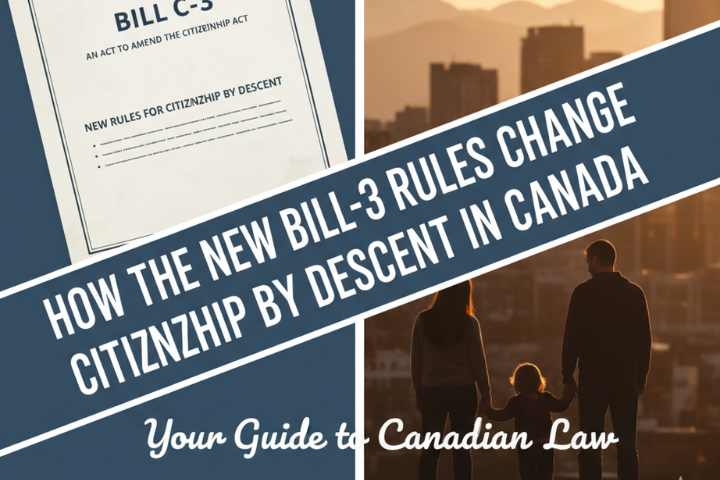

For Canadians living abroad, few things sting like learning your kids born overseas might never inherit your citizenship. The old rules, with their rigid "first-generation limit," slammed the door on families, leaving parents grappling with endless forms, legal fights, and the ache of knowing their children could be cut off from their Canadian roots. Bill C-3, set to roll out by November 2025, is here to fix that heartbreak, rewriting citizenship by descent to keep families connected to Canada, no matter where they call home.
Before Bill C-3, Canada’s citizenship laws were tough on families abroad. If you were born or naturalized in Canada, you could pass citizenship to your kids born overseas—but that was it. Your kids couldn’t pass it to their own children, no matter how deep their Canadian ties. This first-generation cap hit hard: expats raising families abroad, adopted kids, and “Lost Canadians” who slipped through earlier reforms were left out. Imagine growing up with stories of Canada’s lakes and hockey rinks, only to be told you don’t belong. It wasn’t just unfair—it felt personal, tearing families apart from their heritage.
Introduced in June 2025, Bill C-3 updates the Citizenship Act to right these wrongs. Expected to take effect by November, it scraps the one-generation limit and builds a fairer system. The bill does two big things: it restores citizenship for those hurt by old rules and creates a clear path for future generations to inherit Canadian status. It’s not about loopholes or shortcuts—it’s about honoring real connections to Canada, whether you’re in Vancouver or Vietnam.
Bill C-3 starts by healing old wounds, automatically granting citizenship to people caught in the old system’s cracks. This includes:
If this is you or your family, there’s no need to jump through hoops. Once the law kicks in, your citizenship is restored automatically. You can request a proof-of-citizenship certificate to make it official, usually processed without fuss. For many, this closes a painful chapter, letting them reclaim their place in Canada’s story.
For children born or adopted outside Canada after November 2025, Bill C-3 opens the door to citizenship beyond the first generation. The key? Parents need a real tie to Canada. Specifically, you must have spent at least 1,095 days—about three years—in Canada in the five years before your child’s birth or adoption. These days don’t need to be consecutive; just add up time spent visiting, working, or living in Canada. It’s a practical way to show your connection without forcing you to move back permanently.
There are a couple of extra steps for adults claiming citizenship through descent:
These requirements keep the process fair, ensuring citizenship goes to those with a genuine link to Canada.
Navigating Bill C-3 is easier than most immigration processes. Here’s the breakdown:
If you’re feeling overwhelmed, IRCC’s helpline or a local settlement advisor can walk you through it. No need to hire pricey consultants—just stick to official resources.
This isn’t just about paperwork; it’s about keeping your family’s Canadian story alive. Whether you’re raising kids in Australia or your grandkids are growing up in Japan, Bill C-3 ensures they can carry the maple leaf. It’s a fix for the pain of exclusion, letting Canadians abroad pass on their identity without fear of losing it to geography. Canada’s a country built on diverse stories, and this bill honors that, making sure your kids can call it home, too.
Bill C-3 is a game-changer, set to bring relief by November 2025. If your family’s been caught in the citizenship trap, now’s the time to check your status on the IRCC website or start collecting your documents. This is about more than rules—it’s about belonging. Have you or your kids been affected by the old limits? Drop a comment below and share your story. Let’s talk about how Bill C-3 could shape your family’s future in Canada.
Having an 'Identity Verified' badge or being 'Identity Verified' simply indicates that an individual has submitted information to complete our identity verification process or we have conducted internal verification using various authorized websites. While this process includes safeguards, it does not guarantee that the person is who they claim to be.
If you encounter any issues with this profile, please report them here. While all consultants who are verified have RCIC ID, we may not have the latest data in terms of their renewal/cancellation/discontinuation of their RCIC ID.
The "Verified Consultants" profiles are created using publicly available information, including data from the IRCC website, official consultant sites, other listing platforms, and social media. Immiperts.com is an independent platform, not affiliated with IRCC or any registered immigration consultants. To update, claim, or remove your profile, please contact us at [email protected].
╳